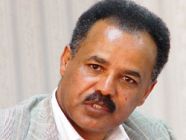Eritrea says international inaction responsible for tension with Ethiopia
ASMARA, June 20 (AFP) — Eritrean President Isaias Afwerki on Monday accused the United Nations and the international community more broadly of fanning instability in the Horn of Africa by treating rival Ethiopia with kid gloves.
 Isaias said Ethiopia was continuing to “drag the region into a dangerous predicament” with the collusion of the world body and powerful nations which refuse to hold Addis Ababa to account for its actions.
Isaias said Ethiopia was continuing to “drag the region into a dangerous predicament” with the collusion of the world body and powerful nations which refuse to hold Addis Ababa to account for its actions.
In a speech delivered to mark Eritrea’s annual Martyrs’ Day commemoration, the president blamed the international community for allegedly allowing Ethiopia to run roughshod over the 2000 peace deal that ended a two-year border war between the two nations.
He also suggested that Ethiopian Prime Minister Meles Zenawi’s government was escaping scrutiny and condemnation for recent deadly post-election violence in which police opened fire on crowds during protests in Addis Ababa.
“It has become unambiguously clear that it is under the intensive care of sympathisers and the auspices of the United Nations, and not through its own ability and ingenuity, that the (Ethiopian) regime continues to occupy our sovereign territories, subjugate the people of Ethiopia, ensure its presence in power and drag the region into a dangerous predicament,” Isaias said.
“On the occasion of Martyrs’ Day, it becomes appropriate that we call on those who claim to tag themselves with the label of ‘international community’ … to shoulder their responsibilities before it is too late,” he said.
Martyrs’ Day, a national holiday here, commemorates those killed during the 1961-1991 struggle for independence from Ethiopia and the 1998-2000 border war.
Official statistics say 65,000 Eritreans died during the independence struggle and 19,000 during the border war although some observers believe the real figure may be far higher.
Isaias, noting that the “martyrs” represent one in every 50 Eritreans now living, said their memories should be preserved with the full implementation of the 2000 peace accord under which Asmara and Addis Ababa were to have accepted the border demarcation of an independent commission.
But three years after the panel issued its “final and binding” ruling, Ethiopia has yet to accept the decision, leading to increased tensions along the border amid reports of troops build-ups.
UN peacekeepers are stationed in a buffer corridor that hugs the length of the 1,000-kilometer (600-mile) border between the two states, and in March the UN envoy for Ethiopia and Eritrea warned that the world must “act fast” to defuse the growing tension or face the risk of a new war.
Asmara regularly blames the international community for not putting enough pressure on Addis Ababa to accept the ruling.
